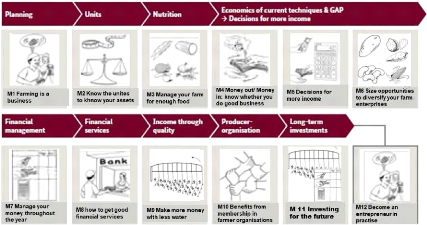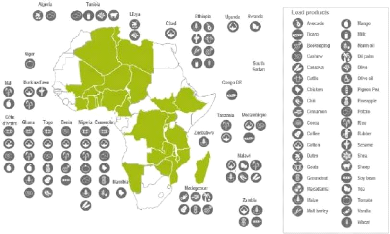|


Technical University of Munich
University of Applied Sciences Weihenstephan-
Triesdorf
Agribusiness management skills for
agricultural smallholders in Africa
In the master's program Agrarmanagement

in cooperation with the
Department of Life Science Systems
Chair for Governance in International Agribusiness
Mohamed Ali Trabelsi
6th semester
Freising, the 30/11/2020
Supervisor: Dr. Sebastian Rahbauer

I|
Table of contents
List of figures II
List of tables II
List of abbreviations III
1 Introduction 6
2 Definition and objective of the Management Task 7
2.1 Management Task 7
2.2 Research questions and Hypotheses 7
3 Material and Methods 8
3.1 Farmer Business School (FBS) 8
3.2 Current Production (Current Scenario) 11
3.3 Improved Production (Improved Scenario) 11
3.4 Material 12
3.5 Methodological Approach 14
4 Result Analysis 16
4.1 Cause and effect analysis 16
4.2 Comparative analysis 20
4.2.1 Productivity 20
4.2.2 Profitability 20
4.2.3 Stability: 31
4.2.4 Diversification 32
4.2.5 Sustainability 33
5 Discussion and Interpretation 35
6 Conclusion 37
Bibliography 38
Annex 40

II|
Information regarding GIZ, GmbH. 40
Information regarding ABF 41
Macroeconomic Analysis 42
List of figures
Figure 1 Overview of the FBS modules 9
Figure 2 Dissemination of FBS in Africa 10
Figure 3 selected FBS Training 12
Figure 4 Google Maps. (n.d.). location of the municipality el
Oued 13
Figure 5 Ichikawa Diagram (Ishikawa 1990) 15
Figure 6 Cause and effect Analysis for the farm 16
Figure 7 Classification of Agribusiness Management Skills
18
Figure 8 Overview of production costs and profit margin 23
Figure 9 comparison of onion production costs and profit
margin 25
Figure 10 comparison of peanut production costs and profit
margin 26
Figure 11 Summary percent change of the 3 activities 26
Figure 12 share of total output Value 27
Figure 13 Potato Gross Margin evolution for both scenario
28
Figure 14 Unit cost evolution for both scenario 29
Figure 15 Depreciation of Mini-pivot and Plumbing 33
Figure 16 PESTEL Analysis for the Smallholder 44
List of tables
Table 1 Productivity of main and secondary product 20

III|
Table 2 Potato production Comparative Analysis 22
Table 3 Onion Comparative production Analysis 24
Table 4 Peanut production Comparative Analysis 25
Table 5 comparison of Labor productivity & Capital
productivity 29
Table 6 Additionall job created using GAP 30
Table 7 Production risks taken into account 31
Table 8 The gross Margin for 5 years including risks of the 3
crops 31
Table 9 Calculation of the Coefficient of Variation (CV) for
the improved Scenario 32
Table 10 Calculation of Simpson's Diversity Index for both
scenario 32
Table 11 Mini-pivot Investment Inventory 33
Table 12 End-of-year Operating Statement for 3 crops 34
Table 13 Measures for Whole-farm Evaluation over 2 Years 34
List of abbreviations
ABF Agribusiness Facility for Africa
ATVET Agricultural Technical Vocational Education and
Training
AU African Union
BASF ''Baden Aniline and Soda Factory (Badische Anilin und
Soda Fabrik)
BMZ German Federal Ministry for Economic Cooperation and
Development (Bundesministerium für wirtschaftliche Zu-
sammenarbeit und Entwicklung)
CV Coefficient of variation
CNIS National Center for Informatics and Statistics Algeria
D Straight-line depreciation
DI Simpson's diversity index

IV|
DZD Algerian Dinar: Currency
FAO Food and Agriculture Organization of the United Nations
FBS Farmer Business School
GAP Good Agriculture Practices
GIZ Deutsche Gesellschaft für Internationale
Zusammenarbeit
GmbH
GM Gross Margin
IMF International Monetary Fund
i-th species
L Expected total years
MADR Ministry of agriculture and rural development Algeria
MSME Micro, Small, and Medium Enterprises
ni Number of individuals
N Population of all individual
ONS National Office of Statistics
pp Potato Price
PV Present Value
ROI Return on Investment
RV Residual Value
SD Standard deviation
SYRPALAC System for large consumption agricultural products
X Observation
S Number of activities
SME Small and Medium Enterprises
TR Total Revenue
UC Unit Cost

VC Variable cost
Y Yield
V|

6|
1 Introduction
In the Algerian Sahara, the production of early vegetable
crops has been made possible by climatic conditions, sufficient land and
groundwater resources, a labor force adapted to these hard-climatic conditions,
and the increasing national demand (Dubost and Larbi 1998).
Alongside the growing date palm and figs in the region Biskra,
the region El Oued has become the leading potato producer in the country and
has produced 1.1 million tons of potatoes in 2014, representing 35% of the
national production. Potato is cultivated mainly by small farmers in circular
plots. It is the main source of income for these investors and their families.
Some farmers practice this production in monoculture (growing and off season),
others have led to crop rotation (potato, onion and Peanut). If the famers are
producing in monoculture, yields are low and face rapid drops, which can reach
50%. (Oueld Rebai et al 2017).
Yield is not the only problem, smallholders face some issues
such as the lack of agronomic skills, market knowledge and efficient use of
modern technologies. Because of these inconvenience as well as the fluctuations
in the market prices and climate change, smallholders cannot boost their income
and sometimes, they make losses.
To address the lack of agronomic skills, organizations and
companies of German Development Cooperation started a program in 2010 in Africa
and have implemented Agribusiness training approaches at a large scale. (GIZ
2010)
Accordingly, farmers will be equipped with knowledge about
entrepreneurial skills to optimize their production and maximize their incomes.
Additionally, they will be able to manage their budget for household
expenditures, education of their children and for the improvement of their
Enterprises. Those skills will have a beneficial impact not only at the farm
level, but also on the scale of food security, economic growth and
employment.
With proper training and more support, smallholders show great
potential for development with better allocation of production factors and
investment decisions. For this reason, it turns out to be interesting to study
the effects of these agribusiness management skills from the perspective of
smallholders. To this study pursues several lines of

7|
Analysis. First, it identifies the agribusiness management
skills and the independencies between them. Second, it compares the
Income-current situation of potato producers in Algeria and the progress after
the participation in the Farmer Business School (FBS) training in terms of
these performance criteria productivity, profitability, stability,
diversification and sustainability.
For the next study (master thesis), the focus will be on
several cases in different countries analyzing the impacts of Agribusiness
management skills for agricultural smallholders in Africa from two
perspectives. The first perspective is Broad-based Human Capacity Development
(HCD) for agricultural smallholders and the role of implementing partners/
partner institutions of German Development Cooperation. The second perspective
is about the contributions to alleviate poverty, food security and employment
generation. Also, more research questions could be tackled and elaborated
including micro and macro-economic analysis, effect of the horizontal-vertical
integration and the advantages of producer's organizations.
2 Definition and objective of the Management Task 2.1 Management
Task
Within the scope of this management internship, the intern
received insight into the Agribusiness Facility for Africa (ABF), a programmer
implemented in 2020 by Deutsche Gesellschaft für Internationale
Zusammenarbeit GIZ, GmbH. ABF is commissioned by the German Federal Ministry
for Economic Cooperation and Development (BMZ). The aim of the management task
is to assess agribusiness management capacities and skills considered important
for agricultural smallholders, economic growth and employment from Agriculture
in Algeria. The following part will be devoted to the questions related to the
theme and then develop the approach on how to answer them.
2.2 Research questions and Hypotheses
The present study will focus on the importance of agribusiness
management capacities for African agricultural smallholders for their incomes,
food security, economic growth and employment.
This study will give answers to the following questions:

o
8|
What's the importance and roles of Agribusiness management
skills which are the improved production techniques, management improvements
and the economic skills for smallholders?
o What are the interdependencies between economic skills and
managerial improvements as well as economic skills and improved productions
techniques?
Meanwhile, these queries will reply to the agricultural
smallholders' demands:
o To what degree the improved production techniques and access
to financing increase our farm profitability?
o What parameters (cost and technical) and performance criteria
must be considered?
o To what degree skills development can lever investments,
intensify agricultural production, increase smallholders' incomes, provide
employment opportunities and contribute to growth?
As a result, the present work highlights the two subsequent
main hypotheses H1 and H2:
o H1: improved production techniques can intensify and increase
yields and profit.
o H2: improved managerial skills and better economic
understanding will impact notably on the farm management and financial
planning.
3 Material and Methods
3.1 Farmer Business School (FBS)
Farmer Business School (FBS) is an approach developed by GIZ
with financial support from the Bill and Melinda Gates Foundation and the World
Cocoa Foundation to promote entrepreneurship and business skills among
smallholder farmers.
In 2010, the Sustainable cocoa business (SCB) project, GIZ and
other public and private partners developed the FBS approach which was adapted
to other food and export products. In fact, 900,000 smallholders have benefited
from the FBS training in 16 different African countries. Currently, a growing
number of GIZ projects and partners are interested in adapting this perspective
to their needs which makes FBS an exceptional asset for GIZ.

9|
Based on empirical learning, the FBS aims to make farmers be
entrepreneurs and investors. It's a necessity in order not only to adopt new
techniques, exploit trade's opportunities and agricultural investments but
also, to ensure better productivity and quality, diversified income and
improved nutrition.
FBS's objective is to professionalize male and female
producers' agricultural business and the input services `management. Nutrition
is one of the FBS approach's objectives which aims to ensure the productive
capacity of adults, the improvements of production efficiencies, product
quality and the creation of professional organizations of producers for the
sake of facilitating access to inputs, services and markets.
Considering the example of Potato, the objectives are
illustrated in the following figure:

Figure 1 Overview of the FBS modules
Source: GIZ/ FBS Potato 2020
FBS is based on one main product and two other complementary
products with good market opportunities having a role in the production, the
improvement of nutrition quality and soil fertility. The promotion of the main
product meets the expectations of local markets, import substitution and
international markets.
This structure of FBS can be easily applied to other
production systems if technical and economic data on production processes are
available. Thanks to the FBS improved knowledge, skills and attitudes,
smallholders are able to increase their income, request financial services and
improve technical knowledge as well as the knowledge of producer organizations
facilitates the promotion of value chains by promoting the

10|
competitiveness of small farms and other actors within it. FBS
is always linked to other services such as extension, finance, product
diversification, market access and producer organization. (Kling 2017)
FBS targets three learning dimensions: entrepreneurs' business
knowledge, skills and attitude to run agriculture as a business. (Matthess
2011).
Regarding the impacts of FBS in Africa 480,000 cocoa producers
in the Ivory Coast, Ghana, Cameroon, Nigeria and Togo participated in FBS
trainings within the SSAB framework. Since 2012, 20 other development programs,
their partners, national organizations such as the Ethiopia Agricultural
Transformation Agency and 7 companies have adapted FBS with support from SSAB
for 34 value chains other than cocoa. In total, more than 1,400,000 farmers
(33% women) in 22 African countries have completed the FBS training.

Figure 2 Dissemination of FBS in Africa
Source: GIZ/V.Kling. 2020. Overview of FBS in Africa
Concerning the introduction and adaptation of FBS training we
can cite the following steps starting with the preparation phase and the
partnership agreements in case of the approach's introduction. Next, the
adaptation related to economic analysis, training material and pilot training
with producers. Afterwards, the development capacity stage which concerns
training, learning and validation of trainers `performance. Finally, the stage
of real-scale delivery and quality management. (Matthess 2017)

11|
3.2 Current Production (Current Scenario)
The current or traditional agricultural production is
characterized by a lack of organization, knowledge and financial resources
which make it inefficient.
For instance, let's take Algeria's case as a current scenario
since it faces many challenging problems in the agricultural sector. When we
talk about Algeria, we refer directly to the desert. The desertification, the
non-use of the desert in the agricultural production, low fertility due to soil
erosion, sand storms and the overexploitation of water tables touch on the
reproductive capacity.
Additionally, the water tables' lowering, the recourse to
fossil water, the salinity and the pollution have decreased the volume of water
available which impact disapprovingly the water's quality. Added to this, the
mobilizable potential of soil and water have reached a critical threshold.
Hence, Algeria, is among the countries that suffer from a high
risk of climate change. Consequently, climate change will lately exacerbate the
anthropogenic factors of degradation originating in the decline in soil
productivity.
| 


